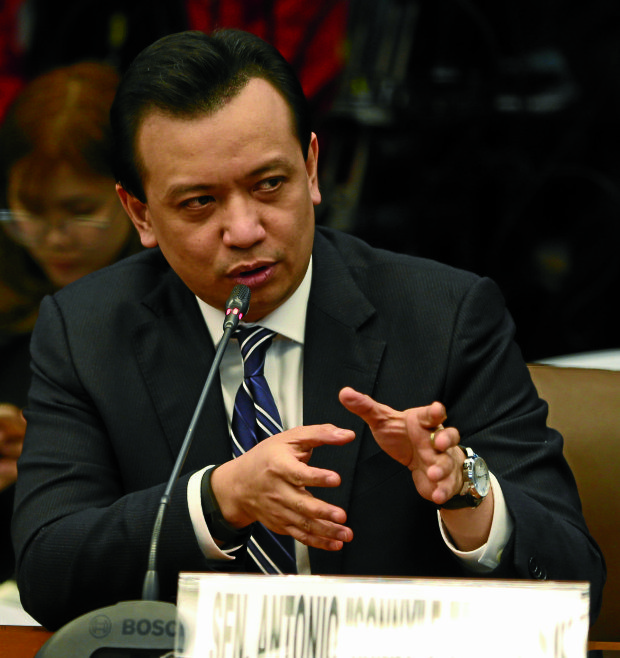Senate body to probe holes in Continuing Professional Dev’t Act

Senator Antonio Trillanes. (File photo by EDWIN BACASMAS / Philippine Daily Inquirer)
The Senate will conduct an inquiry next week on the implementation of the Continuing Professional Development (CPD) Act amid growing complaints against it.
The Senate committee on civil service being chaired by Senator Antonio Trillanes IV is set to hold the hearing on August 9, his staff member said on Tuesday.
“More than a year after the said law took effect, numerous stakeholders have raised pressing issues regarding its implementation, foremost of which are the affordability and accessibility in acquiring CPD units,” said Trillanes in a statement over the weekend.
Republic Act 10912 or the CPD Act, authored by Trillanes, requires professionals to earn CPD units by taking additional formal and non-formal training for the renewal of their Professional Identification Card every three years, effective July 1, 2017.
But after the Professional Regulation Commission (PRC) has issued new guidelines on its implementation, at least 43,000 Filipino professionals have signed an online petition, seeking to review the requirements for license renewal.
Article continues after this advertisementThe professionals complained that with the new requirements, they would be “burdened by costly and time-consuming seminars and trainings.”
Article continues after this advertisementREAD: Professionals sign petition questioning requirements for license renewal
Trillanes acknowledged that numerous professionals, especially those who are unemployed, underemployed or who receive low wages, and casual or contractual employees, may not be able to afford the training, seminar, or courses needed to renew their licenses.
Others, he said, have less access to PRC-accredited institutions, especially those assigned in far-flung areas and are compelled to travel to major cities just to process their applications and complete the required CPD units.
Trillanes also pointed out other issues of various stakeholders such as “the PRC-accredited CPD providers are limited to current providers which are private institutions and the Accredited Integrated Professional Organizations (AIPO), allegedly offering expensive training and seminars; and the PRC does not recognize in-house training by government agencies such as the Department of Education (DepEd) and other companies, which are already instituted and are usually free.”
“Prior to the issuance of the General Implementing Rules and Regulations (IRR) by the PRC, I have proposed measures on how they can implement the law without it becoming a burden to our professionals,” he said.
“Among these are the offering of affordable online courses, so the professionals won’t have to travel in order to gain their units; inclusion of annual seminars of teachers and other professional annual conventions in their CPD units; and providing additional leaves to our professionals so they can attend training and seminars for their units.”
“But to my dismay, I have been informed that the training and seminars they provide remain costly and limited to few accredited training institutions,” added Trillanes.
These problems, he said, were not the intention of the law, which he said was created to help the professionals cope with their respective globalizing field.
The senator then urged the PRC and the Professional Regulatory Boards “to review and amend their implementing or operational guidelines, which should not be burdensome to our professionals.” IDL